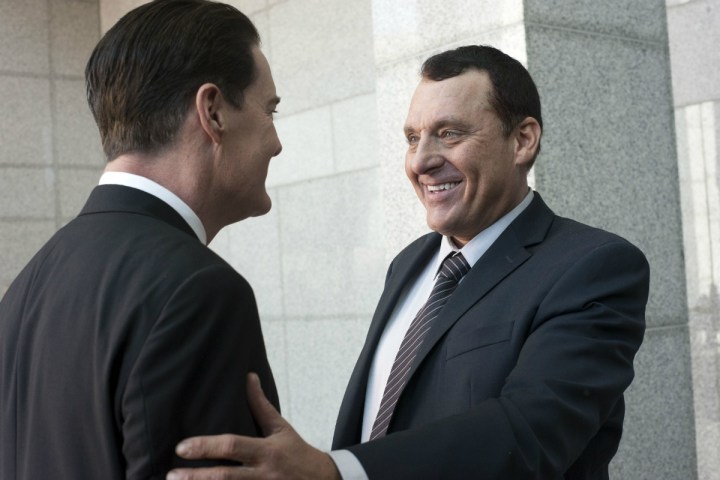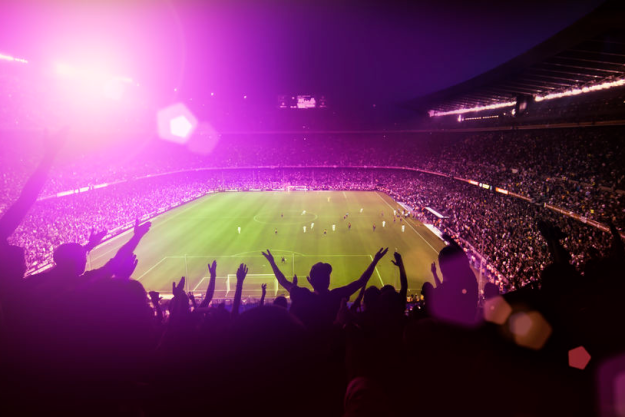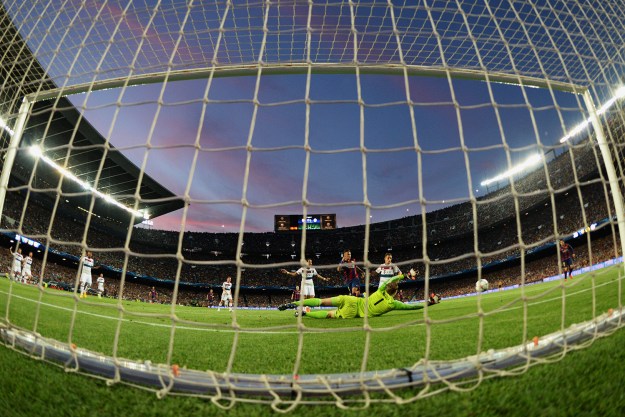
A major difference between Twin Peaks: The Return and other homecoming stories is that Cooper is not just returning physically, but mentally — with every sip of coffee, every taste of cherry pie, a little more of the old Cooper shines through Dougie Jones’ vacant mask. Cooper, bereft of memory, isn’t trying to return to Twin Peaks; outside forces, particularly the spirits of the Black Lodge, are conspiring to bring him there. It may be helpful to take stock of the events concerning Cooper and his doppelgänger, around whom everything revolves.
Who is after Evil Cooper?
What are they up to? And why? The inhabitants of the Black Lodge are an enigmatic group, speaking in free form poetry and operating outside of the constraints of time. What the franchise has established is that they feed on emotions like pain and fear, embodied in the substance garmonbozia, which resembles creamed corn. In the original series and the film Fire Walk with Me, the spirit BOB possessed people and drove them to commit heinous acts in order to generate garmonbozia.
In the season 2 finale, BOB and the doppelganger trap Cooper in the lodge, with the evil Cooper taking his place in the “real” world. BOB’s role as hunter has fallen to Cooper’s doppelgänger, who has spent the years between the old show and the new building a criminal enterprise through brutal methods. He appears to have strayed from his mission, however, as indicated by the lodge’s attempts to bring him back throughout Twin Peaks: The Return.

The spirits of the lodge told Cooper he could leave early in the season, and part of the process involved bringing the doppelgänger back. As Cooper left the lodge in a trail of smoke, the doppelgänger began to have visions of the lodge, and vomited up garmonbozia. Cooper did not swap places with his doppelgänger, however, but with Dougie Jones, another Cooper clone whom the doppelgänger probably created as a decoy. The doppelgänger has since made multiple attempts to have Cooper/Dougie assassinated, working through Duncan Todd (Patrick Fischler).
Ironically, someone else has put a hit on the doppelgänger, convincing his comrades Darya and Ray to assassinate him. As Ray has explained, the person giving them orders is Phillip Jeffries, who has not made an appearance in Twin Peaks: The Return but who occupies an important place in the narrative. Jeffries (David Bowie) was an FBI agent who, like Cooper, Gordon Cole, and Albert Rosenfield, was involved with the Blue Rose task force, which investigated paranormal cases. Jeffries vanished on assignment in Buenos Aires, visiting the Black Lodge and later appearing in Cole’s office, where he described what he saw before disappearing again.
The doppelgänger called Jeffries early in Twin Peaks: The Return, and a voice on the other end warned him that he would be “going back in,” presumably to the lodge. Jeffries, or someone impersonating him, is likely an agent of the lodge, trying to send him back to the lodge where the spirits can harvest the garmonbozia he has collected. To this end, they gave Ray a ring and told him to put it on the doppelgänger after killing him; the doppelgänger forced Ray to wear it, and when the doppelgänger killed him, Ray appeared in the Black Lodge.

The doppelgänger’s motives are unclear, but it is apparent he does not want to return. Perhaps his assignment in the physical world was only supposed to be a temporary one, but he has grown attached to his flesh. He and Cooper cannot coexist — hence his attempts to assassinate the latter — and it seems events are conspiring to bring them both back to Twin Peaks for a final confrontation.
Norma’s restaurant: A metaphor for the creative process?
After watching the doppelgänger defeat a crime boss in an arm wrestling contest — and then actually destroy him with one cataclysmic punch — it may have been hard for viewers to return to the setting of Twin Peaks, where not much appears to be happening. Whereas the original show was set almost entirely in the quiet mountain town, Twin Peaks: The Return has expanded its scope, and the affairs of its inhabitants are small by comparison.
Yet however far the show stretches out, Twin Peaks is its heart, and something as mundane as Norma’s diner business can be potent. As Norma’s business partner exhorts her to relax her standards in pie making, to change up the ingredients and maximize profitability, one can’t help but picture a TV executive pressuring David Lynch and Mark Frost to make alterations to their story, making things more accessible.
Thankfully, the touch of marketability is nowhere to be found. This is a show that doesn’t skimp on the ingredients, and the creators are taking the time to let the pie bake.
For more Twin Peaks discussions, check out our thoughts on Part 12, Part 11, and Part 10.


